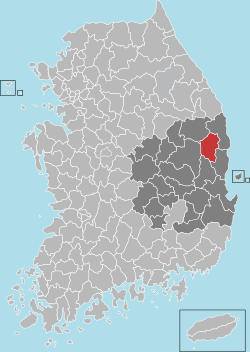Yeongyang
|
Yeongyang 영양군 |
||
|---|---|---|
| County | ||
| Korean transcription(s) | ||
| • Hangul | ||
| • Hanja | ||
| • Revised Romanization | Yeongyang-gun | |
| • McCune-Reischauer | Yŏngyang-gun | |
|
||
 Location in South Korea |
||
| Country |
|
|
| Region | Yeongnam | |
| Administrative divisions | 1 eup, 5 myeon | |
| Area | ||
| • Total | 815.14 km2 (314.73 sq mi) | |
| Population | ||
| • Total | 17,829 (2,016.2.29) | |
| • Density | 21.8/km2 (56/sq mi) | |
| • Dialect | Gyeongsang | |
Yeongyang County (Yeongyang-gun) is an inland county in the north-eastern area of North Gyeongsang Province, South Korea.
An isolated area difficult to access, Yeongyang is sometimes called an "inland island". The county has the lowest population of all counties in North Gyeongsang Province (without Ulleung County), being mountainous with deep ravines, and only 10 percent of land is cultivable. The county is famous for its apples and chili peppers, and is home to the Yeongyang Chili Pepper Experimental Station. From 1984, the county has elected a "Miss Chili Pepper" to represent Yeongyang chili peppers.
The area is also known as a centre of literature, with the tradition of scholars reading and reciting poetry deep in the mountains, from which have emerged Oh Il-do, Cho Chi-hun and Yi Munyol.
Yeongyang is twinned with:
Coordinates: 36°40′0″N 129°06′44″E / 36.66667°N 129.11222°E
...
Wikipedia

